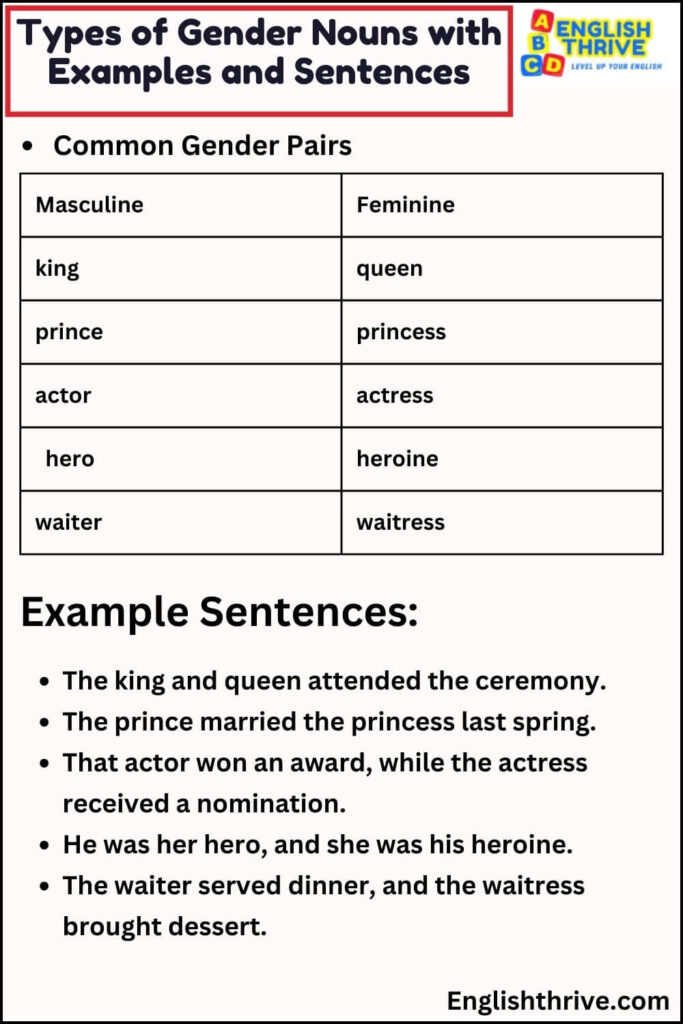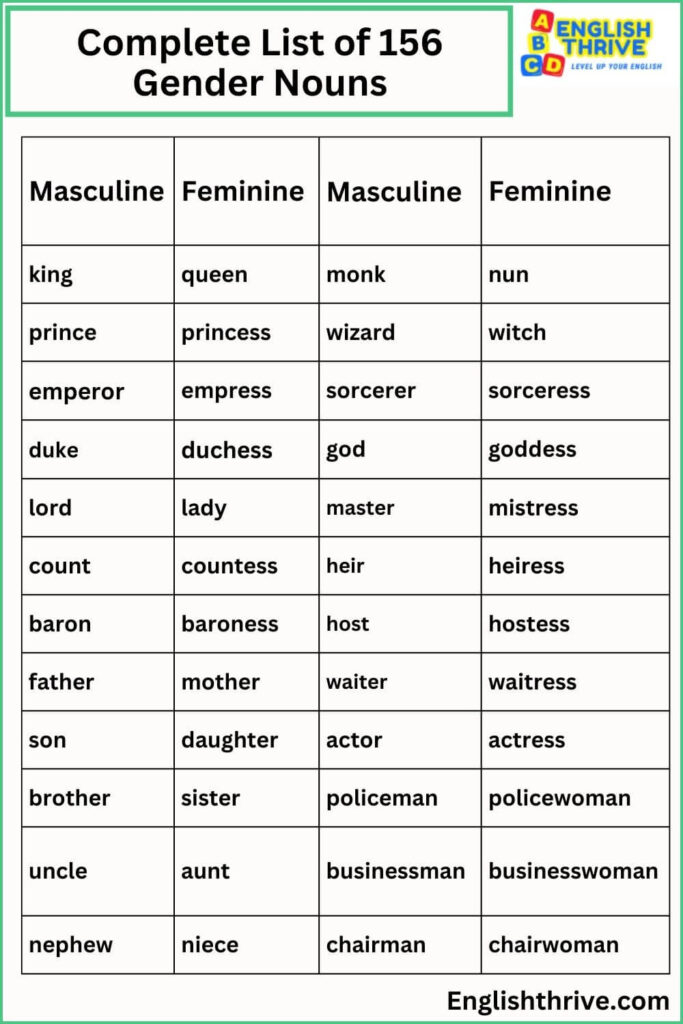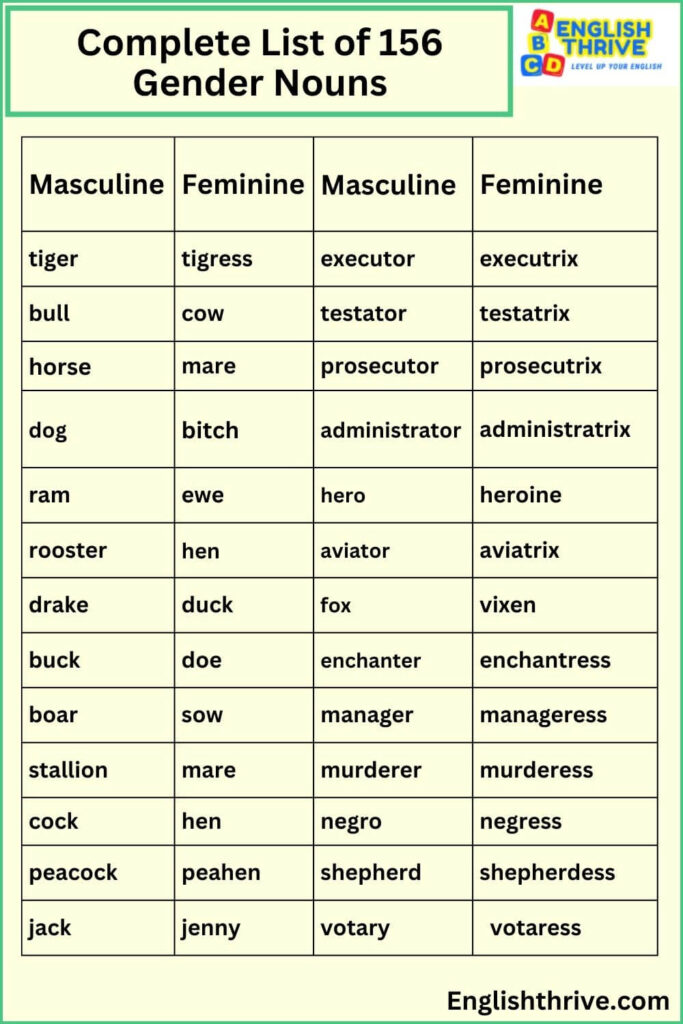Ever wondered why we say “actor” and “actress” or “prince” and “princess”? These are gender nouns in action! As an English teacher for over a decade, I’ve helped countless students master gender nouns examples through simple explanations and practical usage.
Let’s explore these fascinating words that help us be more precise in our language.
Contents
ToggleWhat Are Gender Nouns?
Gender nouns are words that specifically refer to the masculine or feminine form of people, animals, or characters. Some nouns have distinct forms for male and female, while others use the same word regardless of gender.

Types of Gender Nouns with Examples and Sentences
1. Common Gender Pairs
| Masculine | Feminine |
|---|---|
| king | queen |
| prince | princess |
| actor | actress |
| hero | heroine |
| waiter | waitress |
Example Sentences:
- The king and queen attended the ceremony.
- The prince married the princess last spring.
- That actor won an award, while the actress received a nomination.
- He was her hero, and she was his heroine.
- The waiter served dinner, and the waitress brought dessert.
2. Professional Terms
| Masculine | Feminine |
|---|---|
| host | hostess |
| steward | stewardess |
| policeman | policewoman |
| businessman | businesswoman |
| salesman | saleswoman |
Example Sentences:
- The host welcomed guests while the hostess arranged flowers.
- A steward and stewardess helped during the flight.
- The policeman and policewoman patrolled together.
- The businessman partnered with the businesswoman.
- Both salesman and saleswoman exceeded their targets.
3. Family Relations
| Masculine | Feminine |
|---|---|
| father | mother |
| brother | sister |
| uncle | aunt |
| nephew | niece |
| son | daughter |
Example Sentences:
- The father and mother attended the school meeting.
- Her brother played while his sister studied.
- My uncle and aunt visited last weekend.
- The nephew and niece enjoyed the party.
- Their son and daughter graduated together.
4. Animal Terms
| Masculine | Feminine |
|---|---|
| bull | cow |
| rooster | hen |
| lion | lioness |
| tiger | tigress |
| horse | mare |
Example Sentences:
- The bull grazed while the cow rested.
- The rooster woke everyone before the hen laid eggs.
- A lion protected his pride as the lioness hunted.
- The tiger and tigress shared territory.
- The horse galloped beside the mare.
5. Royal/Noble Terms
| Masculine | Feminine |
|---|---|
| emperor | empress |
| duke | duchess |
| lord | lady |
| count | countess |
| baron | baroness |
Example Sentences:
- The emperor and empress ruled the kingdom.
- The duke escorted the duchess to the ball.
- The lord bowed to the lady at court.
- The count danced with the countess.
- The baron and baroness hosted the event.

Complete List of 156 Gender Nouns
| Masculine | Feminine | Masculine | Feminine |
|---|---|---|---|
| king | queen | monk | nun |
| prince | princess | wizard | witch |
| emperor | empress | sorcerer | sorceress |
| duke | duchess | god | goddess |
| lord | lady | master | mistress |
| count | countess | heir | heiress |
| baron | baroness | host | hostess |
| father | mother | waiter | waitress |
| son | daughter | actor | actress |
| brother | sister | policeman | policewoman |
| uncle | aunt | businessman | businesswoman |
| nephew | niece | chairman | chairwoman |
| grandfather | grandmother | landlord | landlady |
| grandson | granddaughter | salesman | saleswoman |
| stepfather | stepmother | spokesman | spokeswoman |
| stepson | stepdaughter | headmaster | headmistress |
| stepbrother | stepsister | steward | stewardess |
| bachelor | spinster | masseur | masseuse |
| groom | bride | author | authoress |
| husband | wife | poet | poetess |
| widower | widow | conductor | conductress |
| lion | lioness | governor | governess |
| tiger | tigress | executor | executrix |
| bull | cow | testator | testatrix |
| horse | mare | prosecutor | prosecutrix |
| dog | bitch | administrator | administratrix |
| ram | ewe | hero | heroine |
| rooster | hen | aviator | aviatrix |
| drake | duck | fox | vixen |
| buck | doe | enchanter | enchantress |
| boar | sow | manager | manageress |
| stallion | mare | murderer | murderess |
| cock | hen | negro | negress |
| peacock | peahen | shepherd | shepherdess |
| gander | goose | tempter | temptress |
| drone | queen bee | tiger | tigress |
| billy goat | nanny goat | traitor | traitress |
| tom | queen | usher | usherette |
| jack | jenny | votary | votaress |
Additional Gender Noun Categories with Examples
Modern Professional Terms
- doctor (gender-neutral)
- teacher (gender-neutral)
- nurse (gender-neutral)
- pilot (gender-neutral)
- chef (gender-neutral)
Historical Terms
- marquis/marquess
- viscount/viscountess
- sultan/sultana
- tsar/tsarina
- raja/rani

FAQs about Gender Nouns Examples-Complete Guide
1. How have gender nouns evolved in modern English?
Modern English has evolved to become more gender-neutral:
- Many professions now use neutral terms (flight attendant vs. steward/stewardess)
- Some feminine forms are becoming obsolete (actor vs. actress)
- New terms emphasize equality (chairperson vs. chairman/chairwoman)
- Job titles focus on role rather than gender
- Language reflects changing social norms
2. What are the patterns in forming feminine gender nouns?
Common patterns include adding:
- -ess (host → hostess)
- -ine (hero → heroine)
- -ix (executor → executrix)
- -woman (policeman → policewoman)
- Complete word changes (father → mother)
3. Why are some gender nouns becoming gender-neutral?
This shift occurs because:
- Workplace equality promotion
- Reducing gender discrimination
- Simplifying language
- Social progress
- Professional respect
4. How do different cultures handle gender in nouns?
Cultural differences include:
- Some languages assign gender to all nouns
- Others have no grammatical gender
- Some use different word endings
- Cultural traditions influence usage
- Modern adaptations vary by region
5. What are common mistakes with gender nouns?
Common errors include:
- Using outdated terms
- Incorrect feminine forms
- Unnecessary gender specification
- Inappropriate context usage
- Inconsistent application
Conclusion
Understanding gender nouns helps us communicate more precisely while being sensitive to modern language trends. These 156 gender noun examples show both traditional pairs and their evolution toward more inclusive alternatives. Whether writing formally or casually, knowing when and how to use gender nouns appropriately enhances your communication skills.

